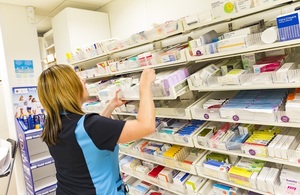Vaccine Taskforce Director General will harness lessons from pandemic to address HRT supply chain issues
The government has announced that Madelaine McTernan CB has been appointed as head of the newly formed HRT taskforce to address issues in the supply chain.

- Successful Vaccine Taskforce approach to be applied to hormone replacement therapy (HRT) supply
- Madelaine McTernan CB, current head of the Vaccine Taskforce, will lead new HRT taskforce, leveraging lessons learned from the successes in vaccine supply to this critical challenge
- Ms McTernan will work closely with industry and stakeholders
Vaccine Taskforce Director General Madelaine McTernan has been appointed to spearhead a new HRT supply taskforce to identify ways to support the HRT supply chain and address shortages some women face on a limited number of products.
Bringing key learnings from the success of the Vaccine Taskforce, Ms McTernan will prioritise HRT over the coming weeks, working closely with suppliers to understand constraints and develop plans for what can be done to ensure both short and long term supply meet rising demand.
Additional members of the Vaccine Taskforce will also be redeployed to support the HRT taskforce as the government doubles down its efforts to ensure women can access high-quality menopause treatment, including HRT, which can be a lifeline for women who are experiencing severe symptoms including hot flushes, night sweats, low mood or anxiety and difficulty sleeping.
Health and Social Care Secretary Sajid Javid said:
I understand how much women rely on HRT which is why we will leave no stone unturned to help make sure women can get the HRT they need.
That is why I have taken decisive action to appoint Madelaine McTernan to Head of the HRT taskforce who will use her excellent skills and expertise to build on the success of the Vaccine Taskforce to bolster supply of vital medicines to women across the country.
Demand for HRT has dramatically risen with a 38% increase in the number of prescription items over the last 7 years as there is greater awareness around the menopause and GPs are more confident in prescribing. There are over 70 HRT products available in the UK and while most remain in good supply, a range of factors, including an increase in demand, has led to shortages of a limited number of products, including Oestrogels.
The HRT taskforce will be responsible for:
- engaging with HRT suppliers to ensure there is a good understanding of supply constraints, what is being or can be done to address them in the short and long term
- working with the NHS Business Services Authority to secure access to real-time HRT dispensing data in order to improve understanding of supply, demand and what is driving shortages
- engaging with professional bodies including the Royal College of GPs, Royal College of Obstetricians and Gynaecologists and the Pharmaceutical Services Negotiating Committee to support pharmacists and prescribers to ensure they respond appropriately to increased demand
Vaccine Taskforce Director General Madelaine McTernan said:
We will apply the key learnings from the successful way the Vaccine Taskforce have procured life-saving vaccines during the pandemic to help ensure women have reliable ongoing access to these critical medicines.
Minister for Women’s Health Maria Caulfield said:
It’s great we’ve seen demand for HRT rise so much over the last year as it means women are accessing the right support. HRT can help women manage severe, sometimes debilitating, symptoms of the menopause, allowing them to stay in workplaces and live more normal lives.
I want all women to feel empowered to speak to their GP about whether HRT would be appropriate for them, and for GPs to feel confident in prescribing.
The new taskforce will play a vital role engaging with suppliers, stakeholders and across government to make sure every avenue is explored to ensure all women who want HRT can access it.
This forms part of the wider government agenda to reduce the gender health gap and increase support for menopausal and peri-menopausal women. In the recent call for evidence to inform the upcoming Women’s Health Strategy, menopause was the third most selected topic that respondents picked for inclusion in the plan, with 48% of respondents selecting this as a priority. This is in line with the governments commitment to tackle health disparities and support everyone to live healthier, happier lives.
We are taking action to increase access and reduce the cost of HRT meaning women can pay a one-off charge equivalent to 2 single prescription charges, currently £18.70, for all their HRT prescriptions for a year.
This prepayment certificate will mean women can access HRT on a month-by-month basis if need be, easing pressure on supply, while keeping the cost of HRT low. This system will be implemented from April 2023.
As set out in our Vision for the Women’s Health Strategy, the menopause will be a key priority in the first government-led Women’s Health Strategy for England. The UK-wide Menopause Taskforce will also consider the role of education and training, workplace policies and peer groups for menopausal women can play in supporting women through what can be a mentally and physically challenging time.
Background
Ms McTernan will remain Director General for the Vaccine Taskforce but will be primarily focused on HRT supply for the short term.
Responsibility for HRT policy and delivery will remain with the Department of Health and Social Care.